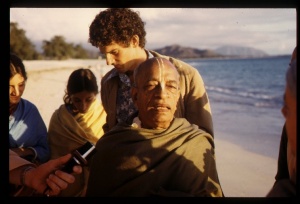SB 6.10.13-14

A.C. Bhaktivedanta Swami Prabhupada
TEXTS 13-14
- athendro vajram udyamya
- nirmitaṁ viśvakarmaṇā
- muneḥ śaktibhir utsikto
- bhagavat-tejasānvitaḥ
- vṛto deva-gaṇaiḥ sarvair
- gajendropary aśobhata
- stūyamāno muni-gaṇais
- trailokyaṁ harṣayann iva
SYNONYMS
atha—thereafter; indraḥ—the King of heaven; vajram—the thunderbolt; udyamya—firmly taking up; nirmitam—manufactured; viśvakarmaṇā—by Viśvakarmā; muneḥ—of the great sage, Dadhīci; śaktibhiḥ—by the power; utsiktaḥ—saturated; bhagavat—of the Supreme Personality of Godhead; tejasā—with spiritual power; anvitaḥ—endowed; vṛtaḥ—encircled; deva-gaṇaiḥ—by the other demigods; sarvaiḥ—all; gajendra—of his elephant carrier; upari—upon the back; aśobhata—shone; stūyamānaḥ—being offered prayers; muni-gaṇaiḥ—by the saintly persons; trai-lokyam—to the three worlds; harṣayan—causing pleasure; iva—as it were.
TRANSLATION
Thereafter, King Indra very firmly took up the thunderbolt manufactured by Viśvakarmā from the bones of Dadhīci. Charged with the exalted power of Dadhīci Muni and enlightened by the power of the Supreme Personality of Godhead, Indra rode on the back of his carrier, Airāvata, surrounded by all the demigods, while all the great sages offered him praise. Thus he shone very beautifully, pleasing the three worlds as he rode off to kill Vṛtrāsura.